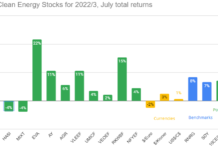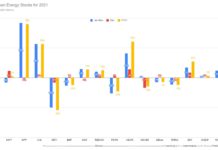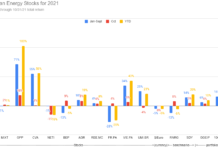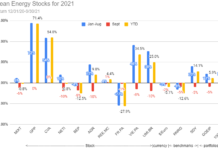Two different opinions on Energy Conversion Devices [NASDAQ:ENER] came out last Thursday (Jan. 11). Analyst Jeffrey W. Bencik at Jefferies & Co said that ENER was one his top 2 picks in the solar industry for ’07, opining that despite continued volatility this should be a rewarding year for ENER investors. He believes that attention will “shift from company specific performance to a top down focus on the evolution of solar incentive schemes.” Jim Cramer, on Thursday’s Mad Money, said he could not, “in good conscience, recommend that stock with oil at $51, going to $49. So, [he is] going to say no, no, no. Sell, sell, sell.”  Cramer argues that ENER will trade based on the price on oil, while Bencik argues that it will trade based on the evolution of solar energy incentive programs, presumably not only in the US but also in places like Europe, Japan and China. I tend to agree with Bencik here. Oil and solar power are not substitutes, except in very rare cases. Governments will continue to forge ahead with various schemes to promote alternative energy regardless of what happens to the price of oil, and, ultimately, that is what will drive revenue growth in the sector. Profitability will be driven by a combination of revenue, scale and technological developments. ENER is doing well on all 3 grounds. Alternative energy investors, as a class, are getting much better at pinning down the factors that are truly driving growth in this space, and the days when a drop in the price of oil caused the whole sector to collapse are coming to and end. Just look at how Suntech Power [NYSE:STP] has performed throughout the latest correction in the price of oil (it is up 19% since Nov. 30, 2006). ENER is currently trading in the mid- to low- 30s: this could be a good entry point. DISCLOSURE: I am long Suntech Power. DISCLAIMER: I am not a registered investment advisor. The information and trades that I provide here are for informational purposes only and are not a solicitation to buy or sell any of these securities. Investing involves substantial risk and you should evaluate your own risk levels before you make any investment. Past results are not an indication of future performance. Please take the time to read the full disclaimer here.
Cramer argues that ENER will trade based on the price on oil, while Bencik argues that it will trade based on the evolution of solar energy incentive programs, presumably not only in the US but also in places like Europe, Japan and China. I tend to agree with Bencik here. Oil and solar power are not substitutes, except in very rare cases. Governments will continue to forge ahead with various schemes to promote alternative energy regardless of what happens to the price of oil, and, ultimately, that is what will drive revenue growth in the sector. Profitability will be driven by a combination of revenue, scale and technological developments. ENER is doing well on all 3 grounds. Alternative energy investors, as a class, are getting much better at pinning down the factors that are truly driving growth in this space, and the days when a drop in the price of oil caused the whole sector to collapse are coming to and end. Just look at how Suntech Power [NYSE:STP] has performed throughout the latest correction in the price of oil (it is up 19% since Nov. 30, 2006). ENER is currently trading in the mid- to low- 30s: this could be a good entry point. DISCLOSURE: I am long Suntech Power. DISCLAIMER: I am not a registered investment advisor. The information and trades that I provide here are for informational purposes only and are not a solicitation to buy or sell any of these securities. Investing involves substantial risk and you should evaluate your own risk levels before you make any investment. Past results are not an indication of future performance. Please take the time to read the full disclaimer here.








I’m no economist – but as a scientist I look at it like this:
I think both Jeffrey W. Bencik AND Jim Cramer are correct in part. This (for solar tech in general) is what could be called “a multicomponent variable system” more than the two they mention.
The value of these companies is almost certainly related to the cost of oil & related fuels since these fundamentally effect the cost of electricity and therefore the cost of consumables in an economy. Secondly, “the evolution of solar energy incentive programs” is almost certainly dependent THE COST OF OIL being a driver for their development and usage when the cost of oil is high. But also on the incident technology available at the time of trade – currently at c.a. 40% efficiency (2006/07). As this efficiency increases by technological innovation, the (relative)* incentives will increase further – generating a driver for their incorporation. Positive feedback. The upper limit being dependent on engineering limits / physical laws. Unfortunately, there is a “tipping point” before this feedback (mass uptake)happens. This may start with only one company in the industry generally.
*relative being, to opposing clean techs.
On the negative side for the trading of these (single-tech companies) are the opposing “Clean-tech Alt-Energy Techs”, if they’re more efficient, more energy intense AND lower cost to manufacture it is likely they will take up more of the overall “incentive programs”… due to competitive advantage. Therefore removing any potential subsidies available (& raising the cost of solar tech).
Therefore think of it like this… you have a background variable = OIL and a foreground variable = technology (energy efficiency)
When the conditions in the background are right (above value oil above “critical point”) and the foreground (efficiency above comparative techs) then this will be successful.
With regard to “environmental factors” such as Climate Change & CO2 mitigation – this should be looked on as a potential “multiplier” for the stock, BUT dependent on sustained-consumer views and political views – which feed into the Foreground variable (and therefore incentive programs).
Charles – it might have been nice to put the VARIATION OF THE STOCK VALUE AND VARIATION OF THE CRUDE OIL PRICE over the same time period for illustration…
Maybe do that for all long term stock illustrations in future??
Anyone wish to expand or challenge these views – go right ahead!
I agree with the last comment… there really isn’t that much difference between the theories. Although Solar is a lousy substitute for oil, oil prices have a big infulence on the potential subsidies for oil. But one thing I’m willing to go out on a limb here: I think Cramer’s wrong when he says “Oil at $51 and going to $49.” Predicting the prices of commodities is a dangerous game, and the “oil heading down” bet is one Cramer is quite likely going to lose.
I agree that the theories are related. I suppose I should have qualified my ‘argument’ somewhat; short and medium-term fluctuations in the price of oil are not going to affect governments’ efforts to encourage the deployment of renewable energy in the foreseeable future. The UK and Spain, for instance, began building much of their current renewable generating capacity before the big run in the price of oil over the past 2 years, and I bet you anything that if oil goes to $45 that is not going to stunt the projected growth in renewable energy in places like California for 2007.
Solar energy is a political favorite and politicians will continue to support it, and that support is what will drive revenue growth in the coming year. Concerns about climate change and energy independence weigh just as much as concerns about the price of oil in that equation, at least certain key jurisdictions.
Both Cramer and Jeffrey W. Bencik are talking about the medium term here, namely 2007. I agree with the latter that, for 2007, the price of oil will have no impact at all on fundamentals for ENER.
Yes Yes, that’s the thing with economics.. and “stockbroking”,
I think Stock-broking (in Alt-Energy) is as much ART as a science.
With these new-technology-stocks, science & engineering are variables, and so a basic understanding of fundamental scientific-principles is beneficial, for effective judgements of R&D programs to be made, to see the “fittest” companies ripe for investing in.
But its also important to see environmental, political and macro-economical factors.
Thinking about it these are trends in all sectors of matured-economies (“knowledge based economies”) – rather than than developing low skill economies (but then this gets complicated again – since a lot of companies invest in low wage countries!).
To me its as much about looking at previous “examples” for similar circumstances, or look at a previous/current examples and try and interpret the true OR related variables and maybe plot them in the background to variations in the stock price and look for correlations and input the big picture “DRIVERS” into the equation. (I’d do that literally as ARROWS on the chart for predictive trends).
Some of that can be simply instinctive when looking at the bigger picture as I am sure there are no possible mathematical (and therefore scientific answers for this) – outside of chaos theorem – on which I’m not an expert!!!
Therefore MASTERING the ART of stock broking can often be done only through experience.
Oh my how this can soon become very complicated!
I don’t envy you at all Charles – but its a fantastic area to be involved in I’m sure! As a problem-solver you have “the perpetual problem” to solve – an ever changing system
*NB Charles, the point about the UK and Spain renewables development…
They’ve resulted from climate change challenges (and particularly in the UK) – going from net oil exporting to net importing over the next several years
In the UK – it was known that oil prices would begin rising… due to supply issues… IN ADVANCE … so it probably was a driver Charles, just the margin in the rise was larger than predicted. (In the UK oil was in the background as I said).
Your right about the $45 figure effect in California too – the market’s been set now by new and future possible legislation on GHGs and GW.
The oil is almost like a PULL-EFFECT – if it goes up and up, solar simply becomes potentially more profitable I feel.
As of right now (15 Jan. 2007) – OPEC are considering cuts… so thats looking good for Solar!
Sorry, I forgot to add:
You’re experiences Charles relative to my own mean: its likely whereas I could make QUALITATIVE predictions of trends (on the above), and my lack of relative-training & experience means you can also make more-accurate QUANTATATIVE predictions (that is “mathematically rigourous”) when suitably reimbursed.
Or much more so than I would be able to do so!
Overall this debate is helpful – since in science gradually we reach consensus for the most important variables through discussion. It’s likely this is the same here.
Therefore enabling easier quantitative analysis – which is in everyone’s interest (for those who wish to make money ethically by investing in Alt Energy!)